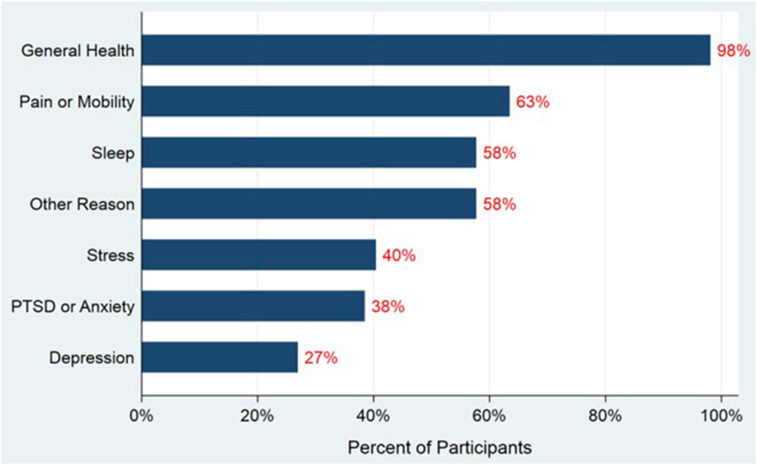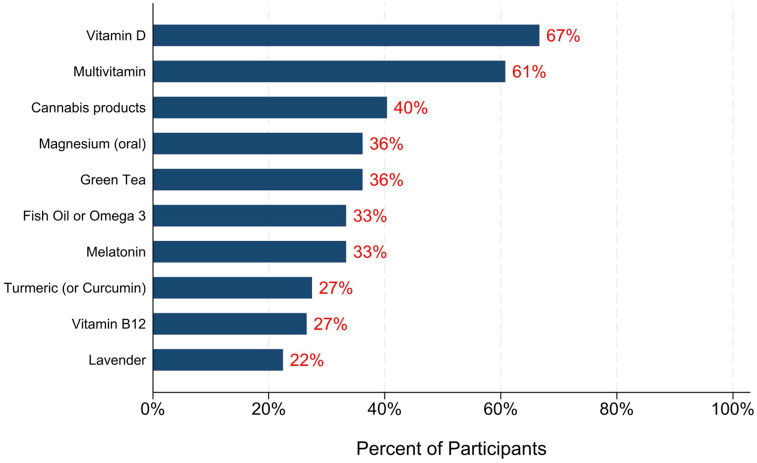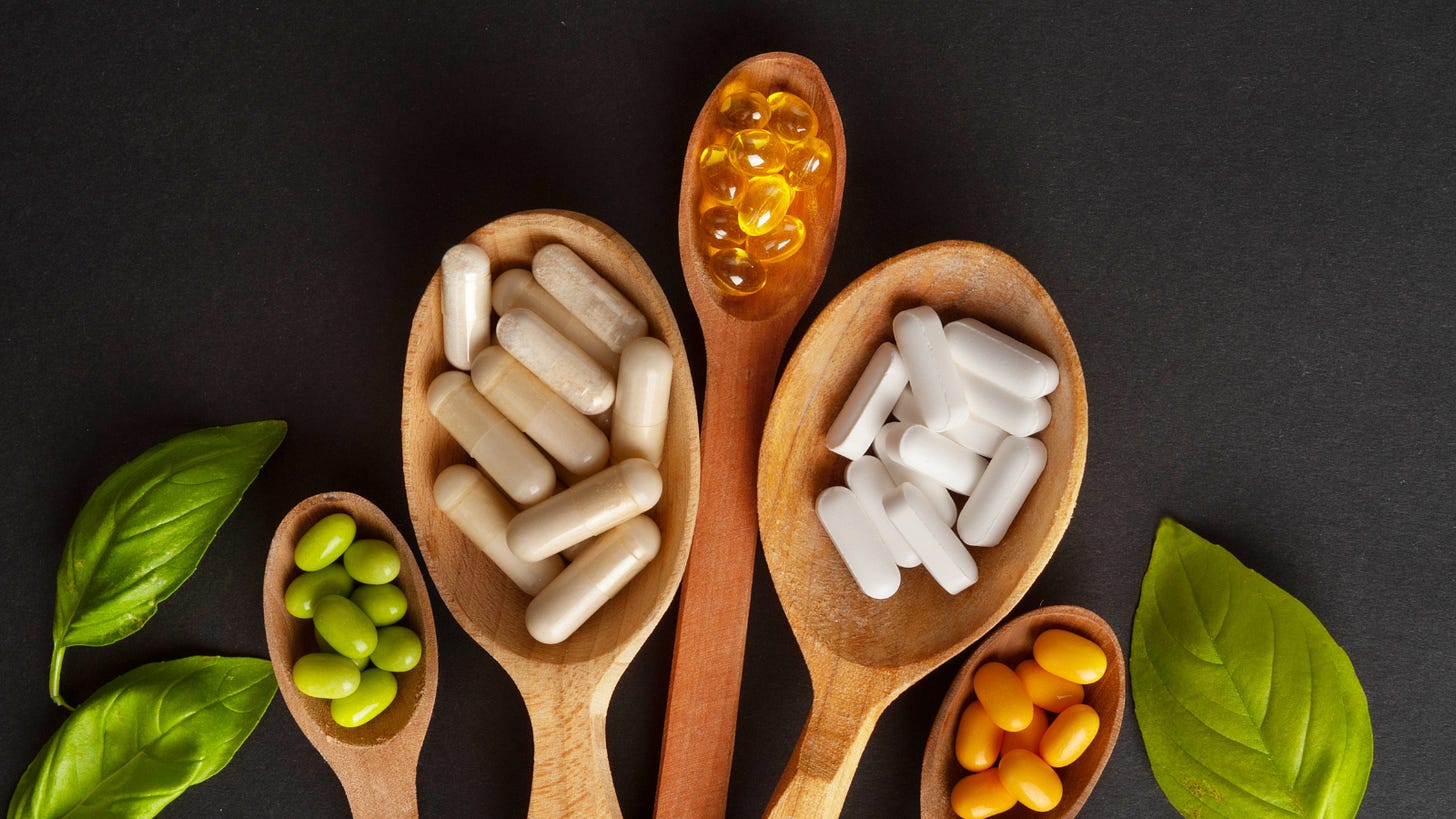Natural Products for Chronic Pain
A new survey of US veterans shows how they use natural products to combat chronic pain.
Did you know that up to 60% of U.S. Veterans report at least one chronic pain condition? Unfortunately, the combination of chronic pain and mental health conditions in veterans is also associated with higher opioid use. A new pilot study involving veterans with chronic pain under the care of the Veterans Administration (VA) was conducted, with 52 veterans completing the study (mean age of 57.6 years, 42% women, 58% men). Participants completed a survey designed to assess the use of natural products among participants over the past 30 days, capturing detailed information on types used, reasons for use, and attitudes toward natural product use.
In this post, I provide a summary of the main findings of the study, but you can also access the full manuscript for free via open access here:
Seal KH, Feinberg T, Moore L, Woodruff NA, Purcell N, Bertenthal D, McCamish N, Becker WR. Natural Product Use for Chronic Pain: A New Survey of Patterns of Use, Beliefs, Concerns, and Disclosure to Providers. Glob Adv Integr Med Health. 2025 Feb 27;14:27536130251320101
Survey Parameters
Participant Preparation: Respondents were instructed to gather all natural products used in the previous month to reference while completing the survey.
Survey Structure: Included 42 color-coded items to enhance readability and facilitate response entry.
Types of Natural Products Assessed:
Multivitamins
Mixed B vitamins
Single vitamins or minerals
Single herbal products (e.g., green tea)
Non-vitamin natural products (e.g., fish oil/omega-3)
Cannabis (categorized as THC-predominant, CBD-predominant, roughly equal, or unknown)
Other natural products used in the past month
Home remedies
Custom Entries: Participants could write in the name and brand of natural products with multiple ingredients (excluding multivitamins and mixed B vitamins).
Data Collected for Each Natural Product:
Frequency and duration of use
Indications for use, including:
Pain or mobility issues
Co-occurring conditions (e.g., sleep problems, posttraumatic stress disorder (PTSD), anxiety, stress, depression, general health, or other reasons)
Experience with the natural product
Beliefs and concerns about natural product use
Disclosure of natural product use to healthcare providers
Survey Outcomes
Most veterans in the study were living with significant daily pain—88% reported moderate to severe pain each day, with high levels of interference in daily life. At the start of the study, 67% were using non-opioid pain medications, 15% used opioids along with other meds, and 17% weren’t using any pain medication. Mental health challenges were also common: 44% screened positive for PTSD, 63% for moderate depression, and 35% for moderate or severe anxiety.

Natural product use was widespread. Participants reported using an average of 4 to 5 different products in the past month, with 17% using eight or more. Most used them daily and had done so for at least six months. Common reasons included general health (98%), pain or mobility issues (63%), sleep (58%), and stress (40%). The most frequently used products were vitamin D (67%), multivitamins (61%), cannabis (40%), magnesium (36%), green tea (36%), fish oil or omega-3 (33%), and melatonin (33%). For managing pain, cannabis was the top choice (33%), followed by magnesium (13%), multivitamins, turmeric, and capsaicin (each 12%).

Among cannabis users, most chose products that combined CBD and THC. Their reasons mirrored overall natural product use: pain (81%), sleep (62%), PTSD or anxiety (43%), stress (43%), and depression (29%). Nearly all participants (92%) said they would use natural products more often if the VA or insurance covered them. Barriers included high cost (31%), lack of availability through the VA (27%), and limited provider support (6%). About 29% used natural products instead of pain medications, most often in place of NSAIDs, acetaminophen, nerve pain medications, and antidepressants.
Veterans expressed strong interest in open communication about natural products—98% believed it was important to discuss use with their providers, though only about half had done so. Of those, most described their providers as supportive or neutral. Beliefs about safety varied: 27% thought NPs were safe because they’re sold over the counter, 39% because they’re “natural,” and 55% believed they were less harmful than medications. Still, concerns remained—over half worried about interactions with prescriptions or other natural products.
The Takeaway
This study highlights a major gap in communication between veterans and their healthcare providers when it comes to natural product use for chronic pain. Many veterans are regularly using natural products like vitamins, herbal supplements, and cannabis—often in place of prescribed medications—yet only about half have discussed this with their doctors. While most participants believed natural products to be safer or less harmful, many also had concerns about side effects or interactions. These findings point to the need for more open conversations between patients and providers about natural product use, especially since many veterans said they would use them more often if they were covered by the VA.
The study also shows a clear need for more research on the safety and effectiveness of natural products in managing pain and related conditions. As natural product use becomes more common, especially among people with chronic health issues, it's essential that providers are equipped with accurate, up-to-date information. Resources are needed to support better communication, informed decision-making, and ultimately, safer and more personalized pain management.
Yours in health, Dr. Quave
Cassandra L. Quave, Ph.D. is a Guggenheim Fellow, CNN Champion for Change, Fellow of the National Academy of Inventors, recipient of The National Academies Award for Excellence in Science Communication, and award-winning author of The Plant Hunter. Her day job is as professor and herbarium director at Emory University School of Medicine, where she leads a group of research scientists studying medicinal plants to find new life-saving drugs from nature. She hosts the Foodie Pharmacology podcast and writes the Nature’s Pharmacy newsletter to share the science behind natural medicines. To support her effort, consider a paid or founding subscription to Nature’s Pharmacy or donation to her lab research.
The Plant Hunter is available in hardcover, paperback, audio, and e-book formats!






